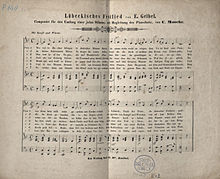Lübeck national song
The Lübeck National Song was the unofficial national anthem of the Free and Hanseatic City of Lübeck .
background
Until the end of its statehood in 1937, Lübeck never had a national anthem with official status. In the second half of the 19th century, however, the custom became established of singing the song Where full cups sound , which is why it was called the Lübeck National Song, on festive public occasions . At the end of the 19th century, singing the song was regarded as an indispensable part of relevant events. In the beginning of the 20th century it fell into disuse and was forgotten.
history

The text of the Lübeck National Song was written by Emanuel Geibel . It was created as a celebratory song for the annual foundation celebration of the Society for the Promotion of Charitable Activities to replace an older song that had been used up until then, and was sung there for the first time on November 2, 1842. The melody was composed by Professor Wilhelm Heinrich Carl Mosche , music teacher at the Katharineum in Lübeck . On November 16, the work, set for pianoforte , was published by Verlag der Lübeck Musikalienhandlung FW Kaibel .
While Geibel's text found general distribution as the national song in the following years, this was not the case for Professor Mosche's composition. It became common practice to sing the song to the melody of Auf, auf zum Happy Hunting , which, however, did not quite fit the verse and required individual lines to be repeated in bulk.
The text occupies a special position among Geibel's poems, as it was never included in his collected works. Towards the end of the 1880s, his authorship was even rumored; Wilhelm von Bippen was considered the actual author . Only when August Sartori discovered what was probably the last copy of the printed version published in 1842 in the holdings of the Lübeck City Library , in which Geibel was named as the author and Mosche as the composer, was both the question of authorship clearly answered and the forgotten original musical version of the Song known again. It found its way into the collection of songs published in 1890 for the use of the Masonic lodges in Lübeck.
In the fleet song book of the German Fleet Association from 1901, the song can be found in the three-verse short version under No. 93 with the title Lübeck, the Hansa Hort and the melody Zu Mantua in Gangs .
In the first years of the 20th century the song gradually lost its importance and finally disappeared from public awareness in Lübeck.
melody

text
Where full
goblets ring in the
circle of German men, It
is well fitting to sing
to the fatherland at a price;
So unless today
we greet you again with the sound of songs
O Lübeck, City of Loyalty,
you German Wall of Freedom!
In the midst of your sisters
You may step boldly,
Have you fought for
the wreath of oak green;
And you are bound in it
The glow of red roses,
It speaks of struggle and wounds,
Of noble hero's blood .
That was in the old days,
When Bornhöved's plan was to
defeat the Danes
in iron.
How did your boys
fall to their deaths there so boldly!
How high
your banner flutters white and red!
And when thirty years ago
the drum passed through the kingdom,
your troops stood
in arms at once.
They fought hard
through night and hardship to victory,
and whoever suffered death
fell in a good war.
So
open up, and want to stand in honor of gray, also for the future,
Let the
airy flags fly on the most distant seas ,
And what
treasures exchanged in foreign brands ,
That lead on a thousand boats
to the German heart.
And inside the walls
There work at the pious hearth,
your senses, your beginning
Be worthy of
yourself and Germany: Give freedom of speech to justice,
to the noble umbrella and hoard,
to the bad one eternal feud,
and: Forward be your word!
So reach your
hand together at the hour, stand
firmly in a good bond, kindled
by love and courage.
Where the hearts beat faithfully
in a joyful association,
it must blossom and meet,
and God will be with us.
literature
- August Sartori : Das Lübeckisches Nationallied , in: Lübeckische Blätter , 31st year, No. 12, p. 66, February 10, 1889
- Eduard Hach : Das Lübeckisches Nationallied , in: Lübeckische Blätter , 31st year, No. 14, p. 79, February 12, 1889
- Karl Theodor Gaedertz : Emanuel Geibel. Singer of love, herald of the realm . Georg Wigand Publishing House, Leipzig 1897
- Otto Boehm : The folk anthems of all states of the German Empire . Eberhardtsche Hof- und Ratsbuchdruckerei, Wismar 1901, p. 79f.
Web links
- Lübeck festival song. Text by Emanuel Geibel. Lübeck: Kaibel, nd , digitized copy of the Lübeck City Library, Sign. Mus P 140
